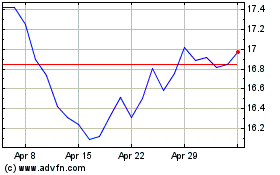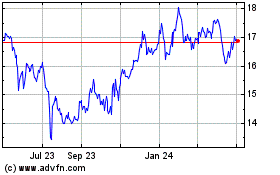By Shalini Ramachandran and Drew FitzGerald
This article is being republished as part of our daily
reproduction of WSJ.com articles that also appeared in the U.S.
print edition of The Wall Street Journal (September 19, 2019).
AT&T Inc. is exploring parting with its DirecTV unit, people
familiar with the matter said, a sharp reversal from Chief
Executive Randall Stephenson's strategy to make the $49 billion bet
on the satellite provider a key piece of the phone giant's
future.
The telecom giant has considered various options, including a
spinoff of DirecTV into a separate public company and a combination
of DirecTV's assets with Dish Network Corp., its satellite-TV
rival, the people said.
AT&T may ultimately decide to keep DirecTV in the fold.
Despite the satellite service's struggles, as consumers drop their
TV connections, it still contributes a sizable volume of cash flow
and customer accounts to its parent.
AT&T acquired DirecTV in 2015 for $49 billion. The company's
shrinking satellite business is under a microscope after activist
investor Elliott Management Corp. disclosed a $3.2 billion stake in
AT&T last week and released a report pushing for strategic
changes. Elliott has told investors that AT&T should unload
DirecTV, The Wall Street Journal has previously reported.
There could be regulatory hurdles to any deal with Dish, which
has about 12 million subscribers. When Dish's predecessor EchoStar
Communications Corp. and DirecTV's former owner Hughes Electronics
Corp. tried to merge in 2001, regulators ultimately blocked it on
antitrust grounds, worried that many rural Americans would be left
with only a single option to get their television service. More
recently, Dish Chairman Charlie Ergen held talks to combine with
DirecTV in 2014, but lost out to AT&T.
On the idea of merging the two satellite providers, AT&T
finance chief John Stephens said, "From a regulatory perspective,
it hasn't been successful and I don't know that there is any change
in that regulatory perspective." He added, speaking last week at an
investor conference, "I understand the industrial logic, but quite
frankly it's been tried and has been rejected."
Jettisoning DirecTV would be an about-face for Mr. Stephenson,
who billed the acquisition of the company as a bold move to
diversify beyond the wireless phone business and tap into a growing
media industry. The deal made AT&T the largest distributor of
pay TV channels, ahead of Comcast Corp. DirecTV is now part of an
entertainment and consumer wireline unit that made up 27% of
AT&T's $173.3 billion 2018 revenue.
AT&T executives have argued that DirecTV's millions of
subscribers, combined with fiber-optic TV customers and cellphone
users, give the telecom giant the scale it needs to compete with
the likes of Netflix Inc. and Walt Disney Co. in entertainment and
Alphabet Inc.'s Google in advertising.
Mr. Stephenson deepened AT&T's bet on media with the
purchase last year of Time Warner Inc., after prevailing in an
antitrust battle. He refused to have AT&T divest itself of
DirecTV when the Justice Department suggested that as a condition
of approving the deal. The government lost the case.
For Mr. Stephenson, who has helmed AT&T for 12 years,
parting ways with DirecTV would be an acknowledgment that a major
cornerstone of his diversification strategy hasn't gone as planned.
It also adds pressure for AT&T to deliver on the promise of the
Time Warner deal. Mr. Stephenson has signaled he is prepared to
step down as CEO as soon as next year, the Journal reported last
week.
This month, Mr. Stephenson elevated his longtime lieutenant John
Stankey to become chief operating officer, a move that sparked
Elliott's decision to go public with its grievances about
AT&T's yearslong empire-building strategy. Mr. Stankey was put
in charge of DirecTV after AT&T acquired it and later moved to
head up WarnerMedia, the renamed Time Warner unit inside AT&T.
He is widely viewed as the heir apparent for the CEO job. But
Elliott viewed his recent promotion to COO as hasty, people
familiar with the matter have said.
AT&T had 26 million U.S. pay-TV customers after it bought
DirecTV, but subscribers have declined at a brisk pace as
cord-cutting drives them to other entertainment options. Its pay-TV
business, which includes satellite TV, fiber-optic video service
and online channels, ended the second quarter with under 23 million
customers. Mr. Stephens warned earlier this month at an investor
conference that it would lose more customers in the third
quarter.
AT&T's DirecTV disappointment follows a long line of
ill-fated deals in media and communications, dating to AOL-Time
Warner. AT&T's wireless rival, Verizon Communications Inc., has
struggled to integrate media into its DNA as well. After spending
more than $9 billion to acquire AOL and Yahoo, Verizon booked a
$4.5 billion accounting charge related to its Oath media business
last year, conceding that the company's bet on high-profile
internet properties hasn't worked out.
In its letter to AT&T's board, Elliott said AT&T's
DirecTV acquisition has come with "damaging results." The hedge
fund criticized AT&T's glitch-filled launch of the DirecTV Now
streaming service and questioned whether the numerous executive
departures at DirecTV compounded AT&T's integration challenges.
Elliott said that poor results at DirecTV "and general concern
about the company's ability to execute" were obscuring stronger
results at AT&T's core telecom businesses.
One reason AT&T may ultimately decide to keep DirecTV aboard
is AT&T's towering net debt load, which stood at more than $160
billion earlier this year. The cash generated by the pay-TV giant
has helped pay down that debt and fueled other investments in the
rest of the company.
Any spinoff of DirecTV would be unlikely until mid-2020 at the
earliest, five years after the deal closed, to make it a
tax-efficient transaction for AT&T, a person familiar with the
matter said.
Dish, which is also struggling in the pay-TV business, would be
a logical partner for DirecTV. People close to Dish said there are
obvious synergies that would come from combining both the national
satellite-TV operators, including stronger leverage in programming
negotiations, a single control center and shared customer-support
operations. Dish also sees value in the cash that the satellite-TV
business generates, which could help fund its diversification into
wireless, the people said.
Speaking Tuesday at an investor conference in New York, Mr.
Ergen said the question remains whether such a union would pass
regulatory muster. "We look at everything," he said.
It is "a unique time in Washington D.C.," said AT&T's Mr.
Stephens, the CFO. Federal agencies earlier this year said they
will approve the merger of T-Mobile US Inc. and Sprint Corp., the
third- and fourth-largest wireless carriers, but the deal is now
being challenged by a coalition of state attorneys general. That
merger also involves Dish, which stands to gain divested cellular
assets if the T-Mobile-Sprint union survives the state
challenge.
DirecTV's domestic and international operations operate as
separate units. Last year, AT&T explored taking DirecTV's Latin
American unit public but shelved the initial public offering amid
tepid interest from investors.
Write to Shalini Ramachandran at shalini.ramachandran@wsj.com
and Drew FitzGerald at andrew.fitzgerald@wsj.com
(END) Dow Jones Newswires
September 19, 2019 02:47 ET (06:47 GMT)
Copyright (c) 2019 Dow Jones & Company, Inc.
AT&T (NYSE:T)
Historical Stock Chart
From Mar 2024 to Apr 2024

AT&T (NYSE:T)
Historical Stock Chart
From Apr 2023 to Apr 2024
